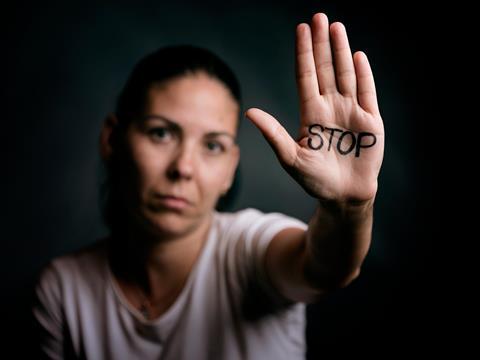Having grown up in the church as a pastor’s daughter, Lauren Seager-Smith, CEO of The For Baby’s Sake Trust, a charity that aims to break cycles of domestic abuse and give babies the best start in life, says, ’it felt and continues to feel like marriage difficulties and harm in relationships were difficult secrets.’

It’s disheartening that I don’t recall ever hearing a sermon about domestic abuse. I remember wedding speeches calling for husbands to love their wives as Christ loved the church, but that’s all I can remember.
As a pastor’s daughter, I would be ushered upstairs because couples who needed help were coming over. This was rightly discussed in confidence and hushed tones, away from my prying eyes and ears, but it felt and continues to feel like marriage difficulties and harm in relationships were difficult secrets.
I’ve been involved in discussions in church around divorce, often with an emphasis on reconciliation, with a level of ambiguity around harms in relationships and their impact. Shockingly, 1 in 5 children are exposed to domestic abuse, and it is a primary factor in referrals to children’s social care.
Domestic abuse affects babies and children in our church and wider communities.
Domestic abuse affects babies and children in our church and wider communities. As the CEO of The For Baby’s Sake Trust, a charity that aims to break cycles of domestic abuse and give babies the best start in life, our goal is to reduce the stigma around discussing domestic abuse and encourage faith communities to be a source of help and hope for families in need.
It’s important to recognise that members of our church community will have experienced the pain of domestic abuse at some point in their lives.
It’s important to recognise that members of our church community will have experienced the pain of domestic abuse at some point in their lives. According to the Office for National Statistics (ONS), an estimated 2.3 million adults aged 16 to 74 years experienced domestic abuse in the year ending March 2020. Domestic abuse can affect anyone, regardless of age, background, or gender. It manifests in various forms, including physical, emotional and psychological, financial, coercive control, sexual, and tech-enabled abuse.
While women are more likely to be affected, it’s essential to remember that men are also impacted, albeit often in silence. We must be vigilant to harmful behaviour and offer our unwavering support to those affected. Signs might include physical injuries, derogatory and hurtful remarks, forced sexual contact, and harassing and controlling behaviours. Look out for signs of emotional distress, fear, secrecy, and minimisation of harm. Be mindful that babies and children are also impacted, be a listening ear, and make sure you respond swiftly to concerns.
We should be mindful of the unrealistic pressure within the church to present perfect family lives and loving marriages, including for those in positions of authority. Anyone can be susceptible to the impact of domestic abuse. It’s also important to understand the external factors that can contribute to such situations, such as substance abuse, financial insecurity, stress, and mental health challenges. Furthermore, it’s heart-breaking to know that it is estimated that up to 30% of domestic abuse begins during pregnancy. Therefore, we must be alert to the signs and support families during this vulnerable time.
Read more on domestic abuse
Is the UK Government’s new ‘flee fund’ for survivors of domestic abuse a good idea?
The government is taking serious action against domestic abuse but there’s more to be done
Let’s create opportunities to have heartfelt; bible inspired conversations about what it truly means to love one another and let’s openly discuss the prevalence and impact of domestic abuse in these conversations and teachings. Let’s make sure we provide safe and supportive spaces for these discussions. It’s important to reach out to those who may be using abusive behaviours and encourage them to seek help and support.
We need to be clear that our approach to safeguarding children and adults includes addressing domestic abuse. Let’s actively promote local and national organisations that can offer support and advice, and let’s take the necessary steps to follow up on any concerns about the safety of children and adults in our church community. The road to healing and support is possible only if we acknowledge the harm. By choosing to stay silent or cover up abuse, we are perpetuating harm, not only to adults but also to their children and future generations. Let’s create a movement of churches that are leading the way in preventing and responding to domestic abuse, creating a space for open dialogue, accountability, healing, and support.
Access our free guide to domestic abuse including signposting to support services here.
If any of these issues have affected you, you can call Premier Lifeline for support. Premier Lifeline is a national, confidential helpline offering a listening ear, emotional and spiritual support from a Christian perspective. If you would like someone to talk with and pray for you, call Premier Lifeline on 0300 111 0101.

































No comments yet